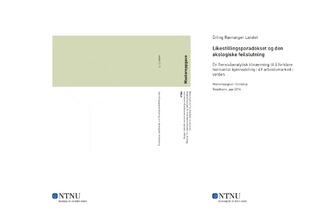| dc.description.abstract | In this thesis, I argue for a need for an individual-level segregation measure in the social sciences, and propose a solution. The measurement is used as a dependent variable in a multi-level analysis of 49 countries across the world to find country-level and individual-level factors that influece horizontal occupational gender segregation. The data used in the analysis is both individual-level demographics collected from 15 merged and harmonized rounds of the International Social Survey Programme, and country-level contextual data collected from various sources. Compositional effects with regards to working sector, work time and having children, only accounts for 2,8% of the variance between countries. Using rational-choice theory, I conclude that tolerance for parental leave is the primary contextual factor influencing both the female proportion in the workforce and horizontal occupational gender segregation. While the dependent variable appears useful, it does suffer from problems due to the hierarchical nature of the International Standard Classification of Occupations, which it is based on. | nb_NO |
